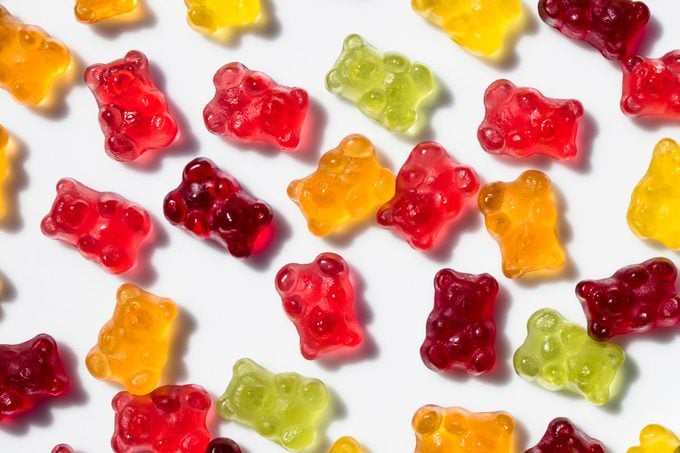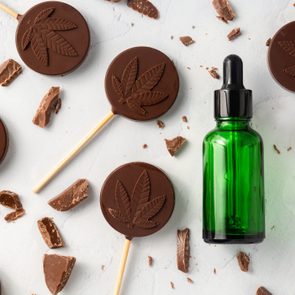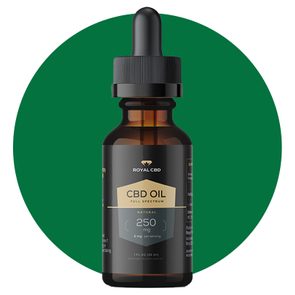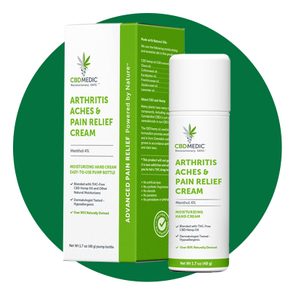Everything You Need to Know About CBD Gummies
Updated: Feb. 16, 2021
Gummies are just one of many CBD products, albeit a tasty one. Learn about the pros and cons of CBD gummies and how to shop for them.
The rise of CBD gummies
If you’ve taken a look at the CBD (cannabidiol) market lately, you’ve probably noticed a mind-boggling array of products, from water, shampoo, and suppositories to CBD-infused pillows, gloves, and, yes, gummies—in a wide variety of shapes, colors, and flavors.
“CBD products are available in almost everything imaginable,” says Sara Jane Ward, assistant professor of pharmacology at Temple University Lewis Katz School of Medicine, in Philadelphia.
Which product you choose depends largely on individual preference and different product characteristics. Gummies have the advantage of being convenient and palatable. Learn more about the pros and cons of gummies and how to choose a product.
What is cannabidiol?
Many people confuse CBD with marijuana, but while the two are related, they’re not the same thing. And they don’t produce the same effect. CBD is one of two major chemicals made by the marijuana plant. CBD does not make you high, but the other main component, delta-9-tetrahydrocannabinol (THC), does.
(Here’s more on the differences between CBD vs THC.)
CBD can also come from the hemp plant, a cousin of the marijuana plant, but with lower THC levels. Since the 2018 Farm Bill was passed, farmers have been allowed to grow hemp as long as it contains 0.3 percent or less THC. (This is how to tell the difference between CBD oil vs hemp oil.)
What are CBD gummies and what do they do?
Gummies are just one type of CBD-infused “edibles,” or products you can eat. They are patterned after regular gummies and come in some of the same shapes like worms, bears, and froggies. Typically they contain some sugar, says Martin A. Lee, co-founder and director of Project CBD, a California nonprofit that promotes CBD research, and author of Smoke Signals: A Social History of Marijuana–Medical, Recreational, and Scientific.
Most of what we know about the effectiveness of CBD products comes from animal studies and from what people say, not from human studies. There’s also not much research on specific formulations. That said, people try gummies for the same reasons they use any other form of CBD: to relieve pain, stress, sleeplessness, and more. (Here are the best CBD creams for pain.)
Any single CBD product may be able to help any of these problems. “CBD is CBD is CBD,” says Ward. “It will be good for some things, hopefully, and there are probably other things it won’t be.” Effectiveness varies from product to product and person to person and depends largely on what dose you take and whether you’re taking gummies or something else.

What are the pros and cons of CBD gummies?
On the plus side, gummies taste better than oils and they’re probably safer than vaping, which has been linked with lung damage, says Ward. They also last longer (up to 12 hours) than many other forms making them helpful for chronic conditions, according to ProjectCBD. They’re also easy and convenient, which is useful if you need them on a busy day. (Learn more about the risks and benefits of CBD vape oil.)
The downside? Gummies take one to two hours to work, longer than some other forms. They also have to pass through your digestive system. While this allows the effect to penetrate all over the body, it also means the CBD can interact with other things in your stomach. “Whether you have it with a meal or on an empty stomach can interfere with absorption,” says Ward. Many people also have to consume higher doses, she adds.
What’s the right dose?
There is no typical dosage for CBD gummies or any other CBD product. Given that there are so few studies on humans, a lot of what we know is from people’s experiences, says Ward, who has been studying the effects of pure CBD on pain in animals for more than a decade. And different people metabolize CBD differently.
According to Project CBD, gummy products range from five milligrams to hundreds of milligrams. As for what people actually use, “the range is huge,” says Ward. Most people find out through trial and error. But the general recommendation is to start low and slowly work your way up if the initial dose doesn’t work, she adds.
Is CBD legal?
The not-so-clear answer is yes, and no. CBD is legal in most states, but the federal government still considers it a controlled substance. On the other hand, CBD from hemp is legal by federal standards. (The National Conference of State Legislatures keeps a state-by-state list of where CBD is legal.) The laws don’t always make a lot of sense, acknowledges Lee, which is one of many reasons you should research CBD before investing (more on that below).
Are CBD products regulated?
Another confusing subject. The Food and Drug Administration has approved only one CBD-derived drug, Epidiolex, for use in children with seizure disorders. The rest of the CBD market—what you see on store shelves, the internet, and even gas stations—is largely unregulated so you don’t always know what’s in the products. (Learn more about using CBD for seizures.)
A November 2020 test of 40 CBD edibles from 21 brands, for instance, found that 63 percent contained more CBD than the label stated. Sometimes this was within 10 percent of the label. But other times it was off by 177 percent. The study was done by Leafreport, a science-based, peer-reviewed site that focuses on CBD products.
Are these products safe?
The issue of safety is related to regulation. CBD products are usually safe. But you can get into trouble if you are taking another medication.
CBD can interact with many different drugs, says Bonni Goldstein, MD, medical director and owner of Cannacenters, a medical practice in Los Angeles, and author of Cannabis is Medicine: How Medical Cannabis and CBD are Healing Everything from Anxiety to Chronic Pain. The National Library of Medicine maintains a full list of potential interactions.
Given the generally lax regulation, you could also end up with a tainted product. “I have seen products with arsenic and lead,” says Dr. Goldstein.
Types of products
All CBD products, including gummies, come in three varieties:
Full-spectrum CBD: This contains all of the components of the hemp plant (Cannabis sativa), including CBD and also small traces of THC and terpenes, which are plant compounds.
Broad-spectrum CBD: This includes all of the components, including CBD, but not THC.
CBD isolates: This is the purest form of CBD and contains only CBD.
Full-spectrum or broad-spectrum products tend to work together synergistically (known as the “entourage effect”) for maximum benefit.
How to buy gummies
There are reputable CBD brands and these should be able to provide you with a certificate of analysis (COA). This indicates that a third-party lab has tested and confirmed the ingredients, says Dr. Goldstein. Many times the COA is available online. Otherwise, you can ask for it.
If the product has a QR code, you can scan it to see the test results, she adds. You’re more likely to get a quality product in a state where CBD is legal. Stay away from products that make health claims as many of these are unsubstantiated.
There are also professional groups, pharmacists, nurses, doctors, and other healthcare professionals. You may have to pay for these services, but they “may save you hours of figuring it out yourself,” says Dr. Goldstein. We’ve also made a Buyer’s Guide for the Best CBD Gummies to help.
The bottom line
CBD gummies may take longer to work than other formulations, but they also last longer. And they’re more palatable. As with all CBD products, do your research or consult with a professional before buying and using.

















